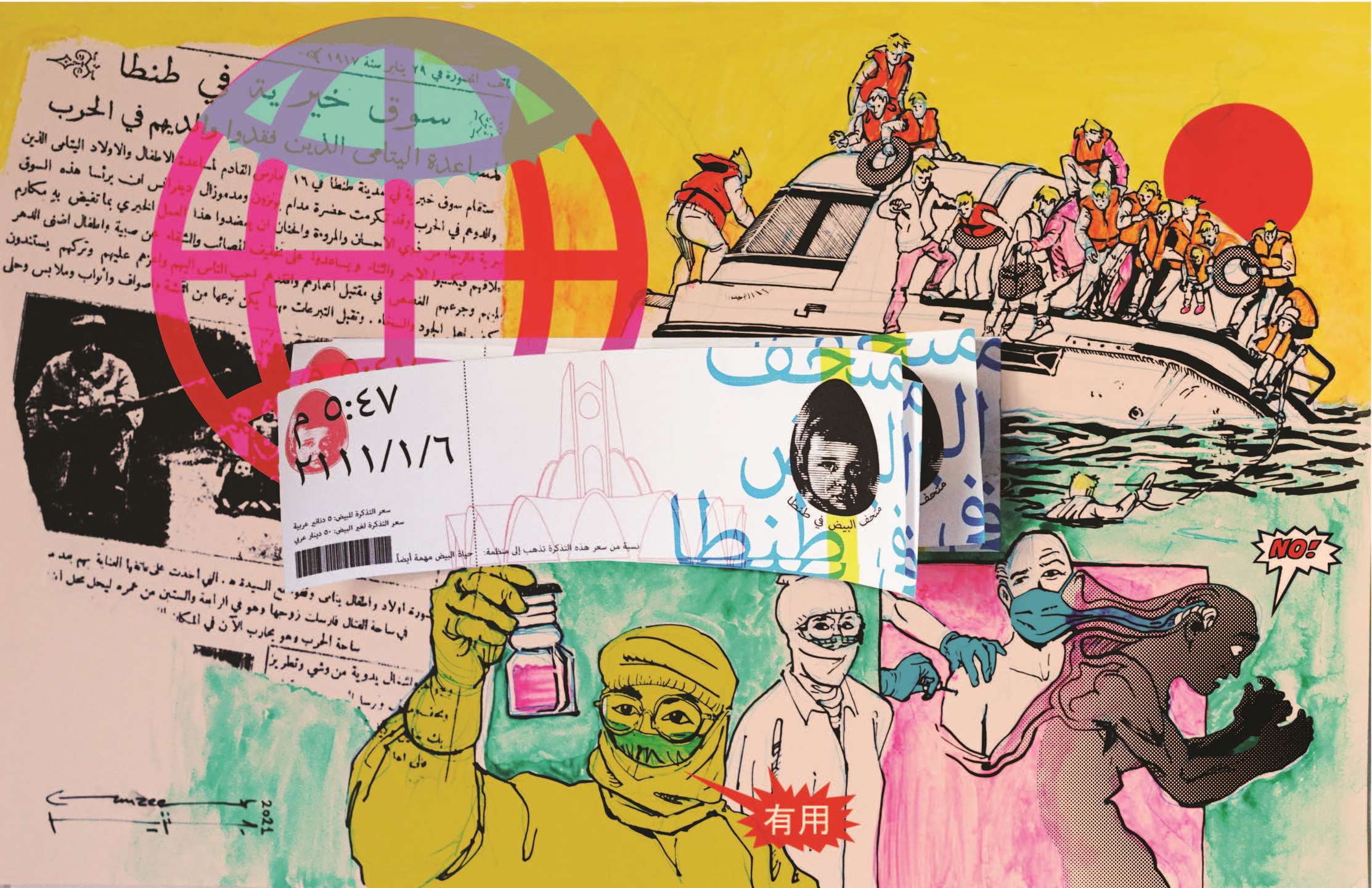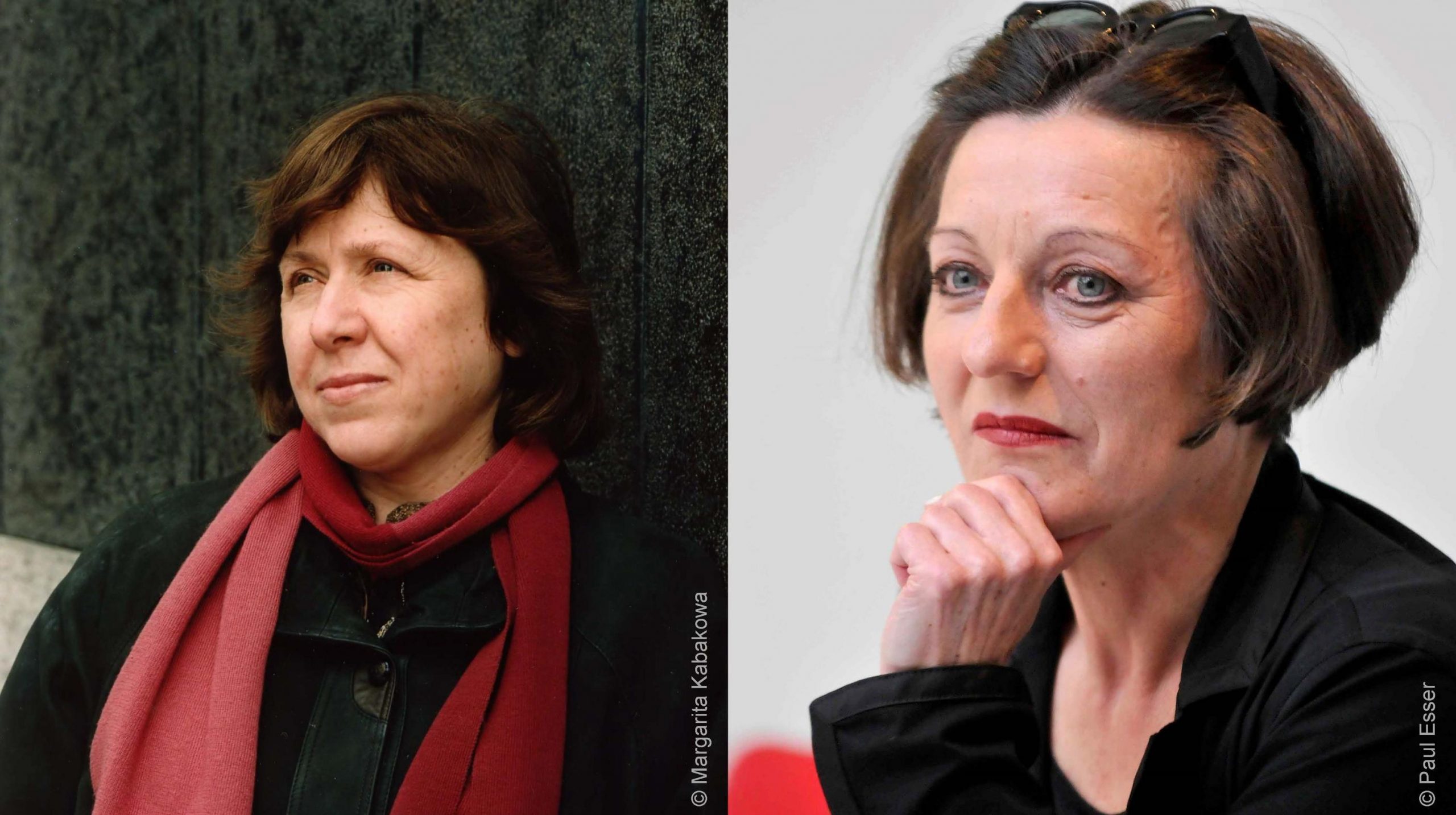Belarus, Literature, 2011
Swetlana
Alexijewitsch
“My hero is the truth,” parried Swetlana Alexijewitsch at the beginning of her literary career, warding off the attack of a censor who resented her deheroizing of the war. The same remark could easily serve as the motto of her steadily growing work – The Autobiography of a Utopie or the History of the Red Individual, an impressive, seven-volume chronicle spanning from World War II to the immediate present and mirroring the destiny of the emotional states of entire societies and epochs.
Owing to her determined pursuit of truth, this highly esteemed and world-renowned writer already mentioned in connection with the Nobel Prize and the recipient of numerous honors in Germany – the 1998 Leipzig Book Award for European Understanding among others – has been repeatedly censored in her homeland, treated with hostility, and dragged to court. Since Lukaschenko’s coming to power in 1994, not a single one of her books could be published in Belarus. For that reason, as a fierce opponent of the totalitarian regime, this writer as militant as she is eloquent has been translated into more than twenty languages and likewise forced to live for periods of time in Italy, France, Sweden, and Germany.
Born in 1948 in Ivano-Frankivsk as the daughter of a Ukrainian mother and a Belarusian father, Swetlana Alexijewitsch worked as a journalist and teacher after completing her studies at the University of Minsk. Her first book, The War’s Unwomanly Face, already finished in 1983, could first appear in 1985 when the Perestroika movement began, and even then was published in a mutilated version. This book presents the women who fought in the Red Army during World War II, approximately one million female soldiers the public knew nothing about. Alexijewitsch interviewed hundreds of them and recorded their accounts. With her investigative work, she did more than fill a substantial gap in the writing of history; she also engaged, for the first time, a literary technique inspired by Belarusian writer and literary scholar Ales Adamowitsch: she allowed a chorus of female eyewitnesses to sing out while she assembled a wealth of perspectives to a highly sophisticated image as artistic as it was true to life. This unique form of poetically-condensed documentation is an effective weapon against forgetting and suppressing, but also against the propagandistic lies spread for generations and the pretending things don’t exist, both of which remain the order of business in dictatorships even today. Alexijewitsch describes her method as follows: “Life offers so many versions and interpretations of the same event – yet fiction and documentation are not enough to embrace the full scope of the moment with. That said, I had to find a different narrative strategy… For an outside observer this might appear to be a simple procedure. People simply tell me their stories. But it’s not quite as simple as that. It’s important what you ask and how you ask it, what you perceive and what you select from the interview.”
Swetlana Alexijewitsch’s highly sensitive, interviewing style sheds light on long ago cast aside matters. She creates for her interlocutor a protective zone in which even the most personal and painful, and occasionally the most embarrassing issues can be admitted – from the slightest stirrings of the soul and overwhelming feelings to gripping stories of loss and betrayal, of killing and dying, of immeasurable sorrow, but always of the love between a man and a woman, between mother and child, alongside the love of mankind and beasts and god – the love of an eternally threatened life.
In her second book, The Last Witnesses, the people she lets speak their mind experienced World War II as children. They describe the war from their previous perspective without being judgmental. This further intensifies the atrocities of a war in which children were forced to watch as their parents were slaughtered or hung, as their villages were burnt to the ground, and barely escaped death themselves. Evolving from this project, Alexijewitsch’s third book, Zinky Boys (1991), confirms the fact that the still-intact powers from both world wars have meanwhile learned nothing. This book is dedicated to the thousands of young soldiers, from all parts of the Soviet Union, who between 1979 and 1985 died in Afghanistan and whose bodies were ‘quietly’ sent home in simple zinc coffins. The public was supposed to learn as little as possible about the devastating consequences of this military campaign. Because of her untiring, taboo-breaching investigative work, Swetlana Alexijewitsch was then charged with committing slander and “defiling the honor of soldiers”. During this period, she completed her final transformation into an uncompromising pacifist: “Since then, no one can ever make me believe that there’s such a thing as a fair war. Anywhere. War – is madness, legitimized madness, legitimized crime. In the twenty-first century, a justification for war is no longer possible. The war in Iraq proves that we have not entered the twenty-first century at all. Instead, we have gone backwards!”
A boundary-breaking war of a different kind is presented in Chernobyl. Chronicle of the Future, her latest book, which she worked on longer than a decade. In the West, we were hardly aware that the nuclear reactor accident left a third of Belarus contaminated, and that every fifth Belarussian suffers heath disorders resulting from it – a situation clearly worsened by the lies spread by Lukaschenko’s administration, since those most affected by the tragedy receive neither the needed information nor effective treatment even today. How quickly a “friendly” atom becomes a deadly atom could not be better described in the East or the West. That alone makes this book essential reading. The full extent of this “invisible” catastrophe is brought to life through a wide variety of eyewitnesses – liquidators, soldiers, children, elderly people, mystics, and rationalists – who make us sensitive to future developments at the same time. Swetlana Alexijewitsch’s clear-sightedness tells us point blank: “We are changing – from a civilization of fear into a civilization of catastrophes. Advancement has become dangerous for mankind and nature alike.”
The War’s Unwomanly Face. Translated from Russian by Johann Warkentin. Published by Henschel Verlag, Berlin, 1987. A new translation by Ganna-Maria Braungardt. Published by Berlin Verlag, Berlin, 2004
The Last Witnesses: Children in World War II. Translated from Russian by Gisela Frankenberg. Published by Verlag Neues Leben, Berlin, 1989. A new translation by Ganna-Maria Braungardt. Published by Aufbau Verlag, Berlin, 2005
Zinky Boys. Afghanistan and its Consequences. Translated from Russisan by Ingeborg Kolinko. Published by S. Fischer Verlag, Frankfurt, 1992
The Call of Death. Stories of Russian Suicide Victims. Translated from Russian by Ingeborg Kolinko. Published by S. Fischer Verlag, Frankfurt, 1994
Chernobyl. Chronicle of the Future. Translated from Russian by Ingeborg Kolinko. Published by Berlin Verlag, Berlin, 1997. New edition 2006
Conversations with the Living and the Dead. Radioplay adaptation by Frank Werner. Directed by Ulrich Gerhardt. Spoken by Ilse Strambowski, Peter Gavajda, and others. Audio book. Published by dhv Verlag, Munich, 2000




